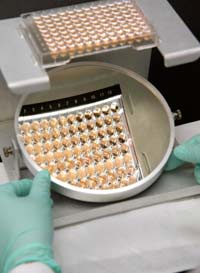
Yes, you can sue for meningitis, a brain infection, if your Can I sue for meningitis?illness is linked to a contaminated medical product or food. It can be difficult to establish the link, but there is genetic testing that can be done on bacteria isolates to find connections between illnesses and products. The results of these tests are evidence that can be used at trial.
The FDA and CDC generally use the following genetic testing processes:
Attorney Fred Pritzker and his team have used this kind of evidence to win compensation for people who developed meningitis from contaminated products.
You can call 1-888-377-8900 (toll free) to talk to an attorney and find out if you have a case. It’s free.
What compensation can I expect?
In most cases, patients can recover the following:
- medical expenses;
- lost income;
- compensation for pain, emotional suffering, disability, loss of quality of life; and
- other money damages allowed by law.
In cases of wrongful death, the family can sue for compensation. Often these kinds of lawsuits are the only way to hold a company accountable for personal injury and wrongful death caused by a contaminated product.
Does Pritzker Hageman Law Firm Have Experience?
Yes, our lawyers have helped people like you in cases involving both food and medical products. We won $4.5 million for one of our clients. He suffered permanent brain damage and has both cognitive (thinking) and gait (walking) issues. After being sickened, he could no longer work at his former job. The settlement helped him get back on his feet.
We won another multimillion-dollar recovery for a woman who was severely injured by an infection caused by an injection. The medication in the syringe was contaminated with fungus. The fungal infection traveled to her brain and caused meningitis, an infection of the lining of the brain called the meninges. Her brain swelled, causing permanent damage. She spent weeks in the hospital and almost died.
In the case above, the CDC found Exserohilum in vials of one of the three lots of implicated medication. Case patients in the outbreak were found to be infected with Aspergillus and Exserohilum, a fungus so rare that most physicians never see it in a lifetime of practicing medicine. Both of these fungi can cause fungal meningitis and stroke.
Can I sue a clinic or hospital for meningitis linked to an injection?
Depending on the facts of your case and the results of tests being done by the FDA and state health officials, you should strongly consider a lawsuit to hold those who are responsible for your illness or the wrongful death of a family member accountable. A top-notch trial lawyer will look at every company in the line of distribution from factory to syringe to find the money needed to compensate you.
One of the questions that needs to be answered is whether the purchasers of the medication did anything to investigate the company from whom they were purchasing drugs that were being injected into the spines of unsuspecting patients. Fred will argue that they should have done their own due diligence to make sure the products were safe. A lawsuit against a clinic, hospital or doctor is referred to as a medical malpractice lawsuit.
How long does it take for illness to set in?
The incubation period for bacteria and fungi are different. With Aspergillus and Exserohilum, for example, it can take up to 3 months. With meningitis caused by Salmonella, a bacteria that can contaminate food, it is generally a few days.
What is a CDC-confirmed-case definition and how does this affect my legal case?
CDC confirmed-case and suspected-case definitions are used to determine who is in an outbreak. If your illness fits within the confirmed-case definition, you are part of the meningitis outbreak. If you have a suspected case, you should still contact our law firm to find out if you can sue for compensation. For the purpose if a case definition, clinically diagnosed meningitis generally means 1 or more of the following symptoms: headache, fever, stiff neck, or photophobia and a CSF profile consistent with meningitis (pleocytosis +/- low glucose, elevated protein). Clinically diagnosed septic arthritis means new or worsening pain with presence of effusion or new or worsening effusion.